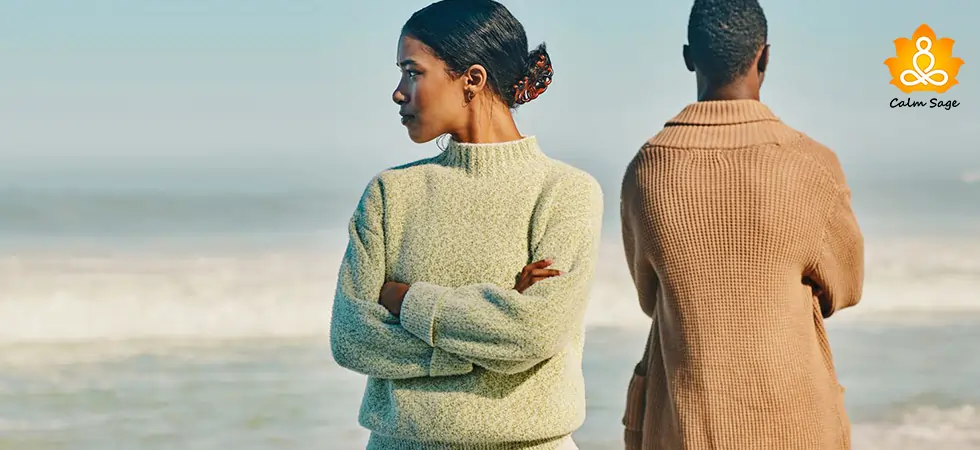Self-Disclosure In Relationships: Risks & Benefits

Have you ever felt like having an honest conversation with your partner and upon doing that your partner took it all the wrong way? Well, it used to happen to me a lot. You know, it’s essential to understand how self-disclosure works in a relationship.
People always say it’s better to be honest about your feelings and thoughts but nobody tells us how and when to be honest. You can’t just blurt your feelings out at any time. Self-disclosure needs to be timed appropriately.
No matter how sorted being honest sounds, it is one of the most difficult things to do. You can’t be brutally honest about your feelings and thoughts as it might risk losing your partner. Therefore, self-disclosure has its benefits as well as risks.
Today we are going to explore all the benefits and risks of self-disclosure in a relationship and what’s the correct way of using self-disclosure. Shall we begin?
What Is Self-Disclosure In Relationships?
Self-disclosure in relationships is known to be one of the most important aspects of a healthy and successful relationship. Self-disclosure in relationships refers to disclosing all your feelings and thoughts about relationships and otherwise to your partner.
It is about being open about what you feel about yourself or your partner or your relationship or anything that influences their relationship. It is about being completely honest and open, keeping nothing hidden from your partner no matter how problematic your thoughts are.
Now, self-disclosure is a very sensitive topic in a relationship. If you can get it right, self-disclosure will take your relationship to another level. But, if self-disclosure is not done right, it can lead to breaking your relationship.
Therefore, it’s important to understand self-disclosure and how it affects your relationship. Knowing the benefits and risks of self-disclosure can help you analyze when and how your relationship needs it.
Also Read: Why Is Communication Important In A Relationship?
Benefits Of Self-Disclosure In Relationships
Self-disclosure in a relationship can be a boon as well as a bane for your relationship. It completely depends on how you choose to use self-disclosure in your relationship. You don’t have to mindlessly just disclose things when your partner is not even ready to receive such a piece of information.
Let’s look at the benefits and drawbacks of self-disclosure in a relationship so that you can assess how self-disclosure will affect your relationship.
Benefits of self-disclosure in a relationship;
- Strengthens emotional connection: when you choose to disclose your true feelings to your partner, it leads to a stronger emotional connection with your partner. Your partner knows exactly how you feel.
- Induces happiness in relationships: self-disclosure keeps your partner aware of all your feelings and thoughts therefore there is no room for misunderstanding. Lesser misunderstanding and the happier you are in your relationship.
- Increases the bond: self-disclosure makes your partner love you even more because they know your true self. There is no pretense in the relationship because of active self-disclosure, making your bond even stronger.
- Builds trust: self-disclosure in a relationship is one of the best ways to build trust. You have nothing hidden from your partner therefore they can trust you blindly.
- Increases relationship quality: when there is complete disclosure in a relationship, the quality increases because there is no doubt or misunderstanding caused. Self-disclosure helps you give sufficient information to keep the relationship strong.
Also Read: Stonewalling in a Relationship: Emotional Effects And How to Deal With it
Risks Of Self-Disclosure In A Relationship
The risk of self-disclosure in a relationship is not as strong but one wrong move and self-disclosure can ruin the relationship. Self-disclosure is something that needs to be timed correctly so that your partner is not thrown away by overwhelming information.
However less the risks self-disclosure poses, the impact can be huge on your relationship. Therefore, you should always be careful when it comes to self-disclosure in a relationship. Let’s look at some risks of self-disclosure in a relationship;
1. Increase conflicts: if you constantly disclose your discomfort about something without giving them time to make things right, self-disclosure can increase conflicts in your relationship.
2. Shock your partner: self-disclosure is needed to be planned, if you leave it as an unguided missile, it will leave your partner shocked. All this new information can unpleasantly surprise your partner and make them feel uncomfortable.
3. Dishearten your partner: when self-disclosure includes a lot of intrusive thoughts and insecurities, it can sometimes dishearten your partner. They might feel like no matter how hard they work for the relationship; their insecurities aren’t going away.
Also Read: 10 Green Flags In A Relationship: Moving To a Healthy Relationship
How To Use Self-Disclosure In Relationships?
Now that you know the benefits and risks of self-disclosure in a relationship, I’m sure you are confused as to how to make sure self-disclosure doesn’t ruin your relationship. When I first read about the risks and benefits of self-disclosure in a relationship I was confused too.
But you don’t need to worry because we have got you covered. Here are a few things you need to keep in mind while exercising self-disclosure in your relationship to ensure it doesn’t work against you;
1. Keep it slow: do not bombard your partner with all this new and overwhelming information at once. Keep it slow and allow your partner to come to terms with your self-disclosure.
2. Choose the information wisely: do not begin with the most controversial information. Always begin with non-intense topics first and then slowly move to intense ones.
3. Try to make self-disclosure reciprocal: self-disclosure in a relationship must be mutual. If not, it will make one partner feel overwhelmed and another one insecure. Make sure it is reciprocal.
4. Begin on a happy note: self-disclosure is something that needs to be practiced because accepting honest feelings and thoughts needs some time. Therefore, always begin with happy self-disclosure so that your partner accepts the concept of self-disclosure and doesn’t get scared of it.
That’s All Folks!
I hope you found this blog about self-disclosure in a relationship helpful, interesting, and thought-provoking. Do share this blog with your friends and family so that we all know the risks and benefits of self-disclosure in relationships and how to use it well.
Thanks for reading.
Take care and stay safe.




















